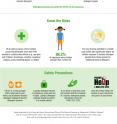New study finds laundry detergent packets more dangerous than other types of detergent
A new study conducted by the Center for Injury Research and Policy of the Research Institute at Nationwide Children's Hospital and the Central Ohio Poison Center found that exposure to laundry detergent packets is more dangerous to young children than exposure to other types of laundry and dishwasher detergent. The study, published online today in Pediatrics, found that from January 2013 through December 2014 Poison Control Centers in the U.S. received 62,254 calls related to laundry and dishwasher detergent exposures among children younger than 6 years old. The study included calls about both traditional detergent and detergent packets and found that detergent packets accounted for 60 percent of all calls. Almost half (45 percent) of the calls for exposure to laundry detergent packets were referred to a health care facility for evaluation and treatment, significantly more than calls related to exposures to traditional laundry detergent (17 percent), traditional dishwasher detergent (four percent), or dishwasher detergent packets (five percent).
Incidents related to laundry detergent packets saw the biggest rise - increasing 17 percent over the two year study period. Poison control centers received more than 30 calls a day about children who had been exposed to a laundry detergent packet, which is about one call every 45 minutes.
In addition, the most serious clinical effects such as coma, trouble breathing, heart problems, and death, were only seen in children exposed to the chemicals in laundry detergent packets. The risks of having a clinical effect, a serious medical outcome, hospitalization, or intubation were significantly higher for children who had been exposed to the chemicals in a laundry detergent packet than for those exposed to any other type of laundry or dishwasher detergent. At least one child a day in the U.S. was admitted to the hospital due to a laundry detergent packet exposure. The two child deaths in this study were both associated with exposure to laundry detergent packets.
In an effort to reduce unintentional exposures to the contents of laundry detergent packets, ASTM published a voluntary Standard Safety Specification for Liquid Laundry Packets in 2015, but some experts feel it did not go far enough.
"This voluntary standard is a good first step, but it needs to be strengthened," said Gary Smith, MD, DrPH, the senior author of the study and director of the Center for Injury Research and Policy at Nationwide Children's Hospital. "Unless this unacceptably high number of exposures declines dramatically, manufacturers need to continue to find ways to make this product and its packaging safer for children."
Experts recommend that families with children younger than 6 years old use traditional detergent instead of packets. "Many families don't realize how toxic these highly concentrated laundry detergent packets are," says Marcel J. Casavant, MD a co-author of the study, chief of toxicology at Nationwide Children's Hospital and medical director of the Central Ohio Poison Center. "Use traditional laundry detergent when you have young kids in your home. It isn't worth the risk when there is a safer and effective alternative available."
Parents and child caregivers can help children stay safer by following these tips:
People who have young children that live in or visit their home should use traditional laundry detergent, which is much less toxic than laundry detergent packets. Store all laundry detergent including packets up, away, and out of sight - in a locked cabinet is best for laundry packets. Close laundry detergent packet packages or containers and put them away immediately after use. Save the national Poison Help Line number (1-800-222-1222) in your cell phone and post it near your home phones.
Source: Nationwide Children's Hospital
Other sources
- Laundry pods more toxic than traditional detergents: studyfrom CBC: Technology & ScienceTue, 26 Apr 2016, 19:00:46 UTC
- More kids being poisoned by detergent pods: Studyfrom UPIMon, 25 Apr 2016, 15:30:43 UTC
- New study finds laundry detergent packets more dangerous than other types of detergentfrom Science DailyMon, 25 Apr 2016, 14:30:49 UTC
- Laundry detergent packets more dangerous than other types of detergentfrom Science BlogMon, 25 Apr 2016, 12:50:42 UTC
